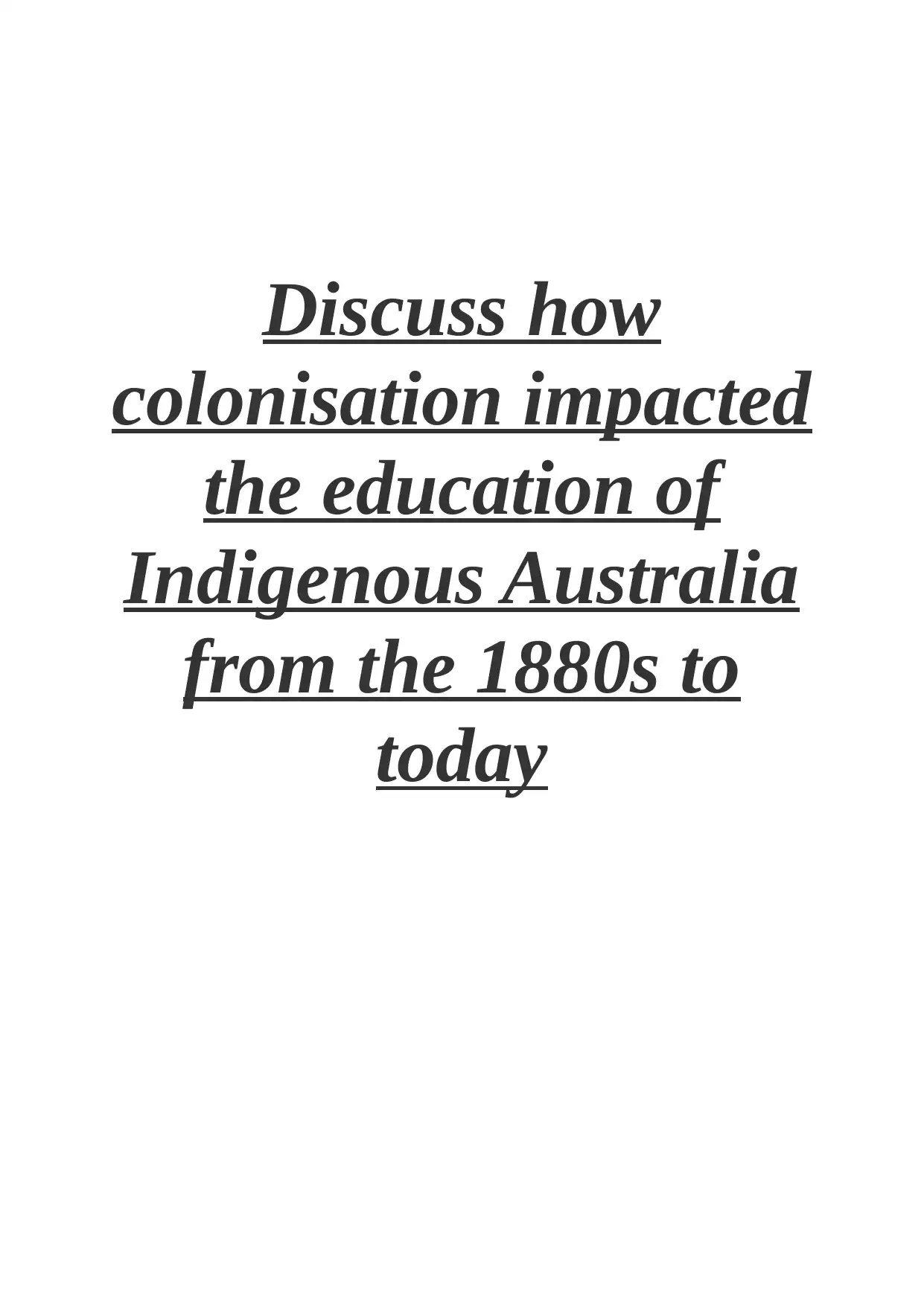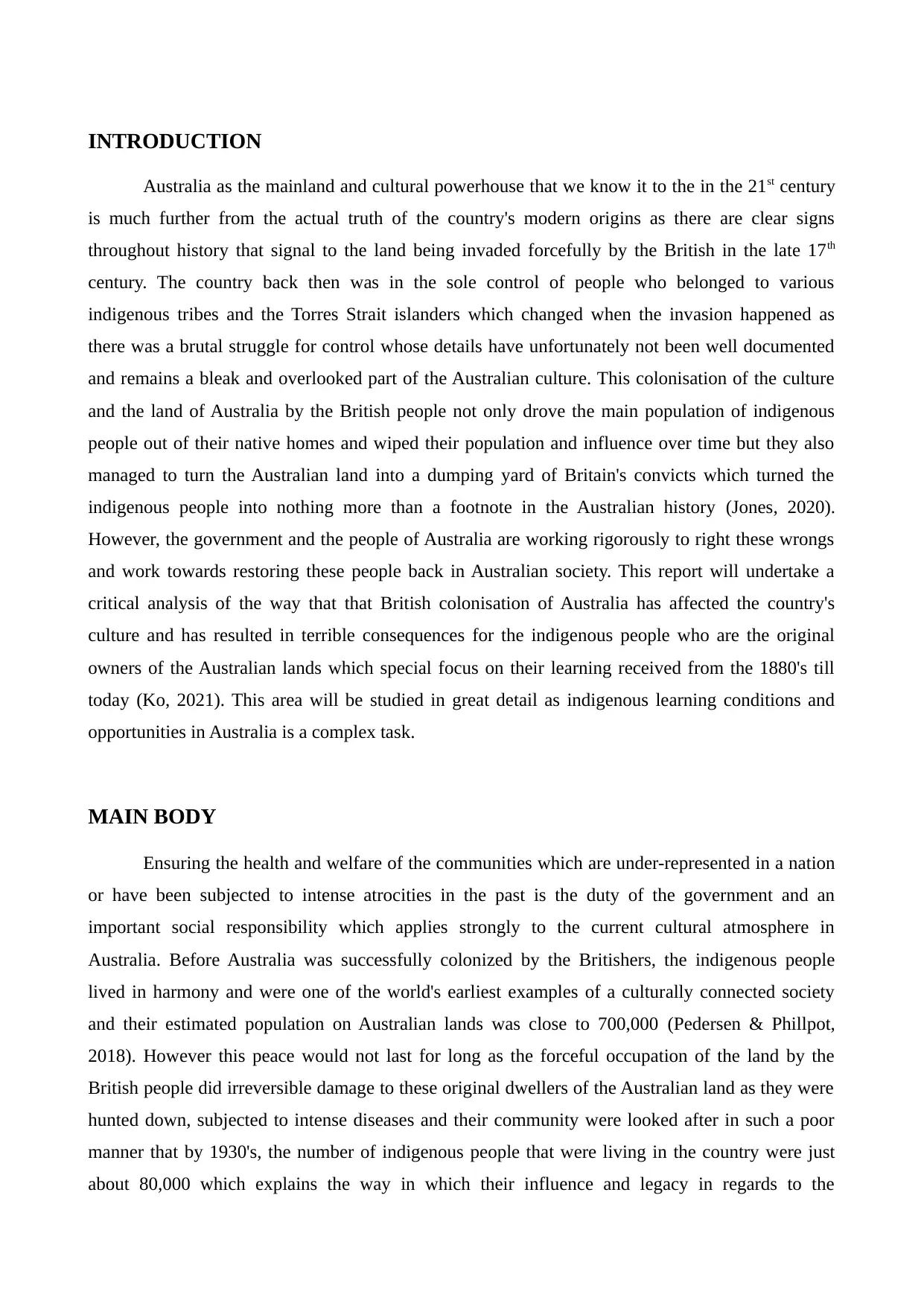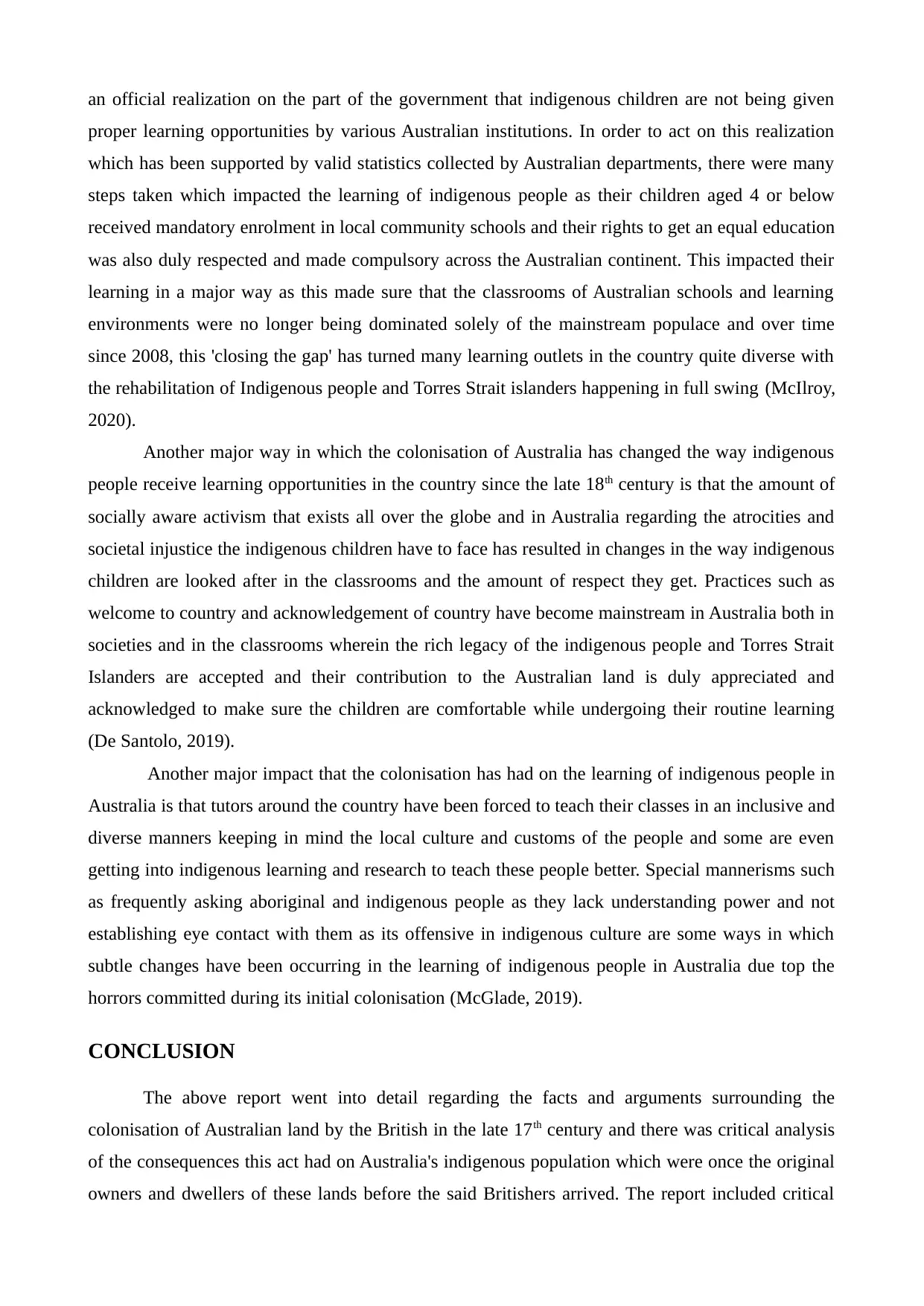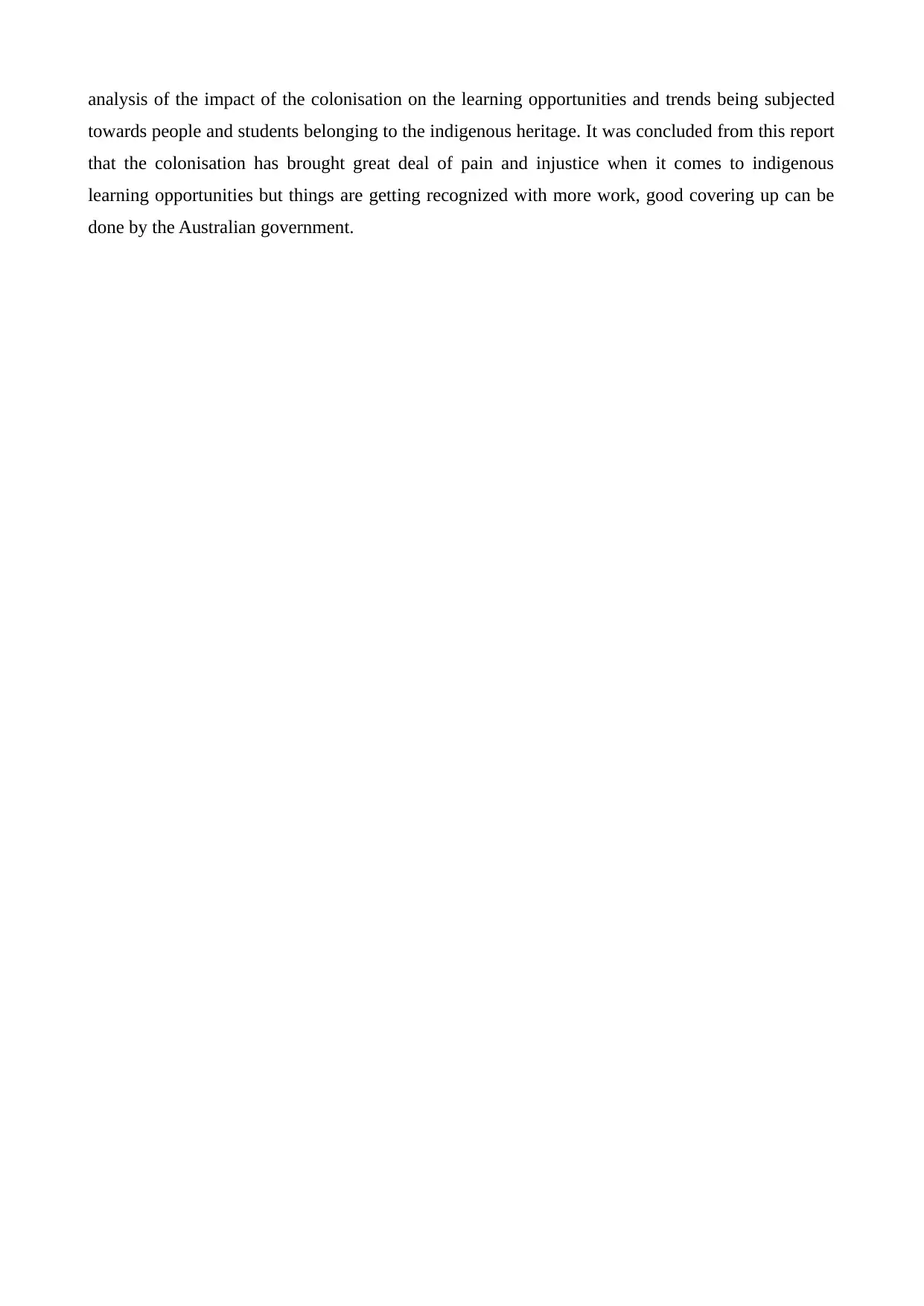Impact of Colonisation on Indigenous Education: A Historical Analysis
VerifiedAdded on 2023/06/10
|7
|2011
|395
Essay
AI Summary
This essay critically analyzes the impact of British colonisation on Indigenous education in Australia from the 1880s to the present day. It begins with an introduction outlining the historical context of colonisation and its impact on the Indigenous population, including the dispossession of land and cultural disruption. The main body of the essay explores various aspects of this impact, such as the decline in Indigenous population due to disease and oppression, the denial of voting rights and official recognition, and the lasting effects of the 'Terra Nullius' concept. The essay examines the traditional schooling system's shortcomings, the 'gap' in educational opportunities, and the changes brought about by policies aimed at closing this gap. It also discusses the role of social activism in promoting inclusivity and cultural respect in classrooms. The conclusion summarizes the key arguments, emphasizing the long-term consequences of colonisation on Indigenous education and acknowledging the efforts to address these issues. The essay highlights the importance of understanding the historical context to promote equitable educational opportunities for Indigenous Australians and Torres Strait Islanders. The essay uses several academic sources to support its claims.

Discuss how
colonisation impacted
the education of
Indigenous Australia
from the 1880s to
today
colonisation impacted
the education of
Indigenous Australia
from the 1880s to
today
Paraphrase This Document
Need a fresh take? Get an instant paraphrase of this document with our AI Paraphraser

Table of Contents
INTRODUCTION................................................................................................................................3
MAIN BODY ......................................................................................................................................3
CONCLUSION ...................................................................................................................................5
REFERENCES ....................................................................................................................................7
INTRODUCTION................................................................................................................................3
MAIN BODY ......................................................................................................................................3
CONCLUSION ...................................................................................................................................5
REFERENCES ....................................................................................................................................7

INTRODUCTION
Australia as the mainland and cultural powerhouse that we know it to the in the 21st century
is much further from the actual truth of the country's modern origins as there are clear signs
throughout history that signal to the land being invaded forcefully by the British in the late 17th
century. The country back then was in the sole control of people who belonged to various
indigenous tribes and the Torres Strait islanders which changed when the invasion happened as
there was a brutal struggle for control whose details have unfortunately not been well documented
and remains a bleak and overlooked part of the Australian culture. This colonisation of the culture
and the land of Australia by the British people not only drove the main population of indigenous
people out of their native homes and wiped their population and influence over time but they also
managed to turn the Australian land into a dumping yard of Britain's convicts which turned the
indigenous people into nothing more than a footnote in the Australian history (Jones, 2020).
However, the government and the people of Australia are working rigorously to right these wrongs
and work towards restoring these people back in Australian society. This report will undertake a
critical analysis of the way that that British colonisation of Australia has affected the country's
culture and has resulted in terrible consequences for the indigenous people who are the original
owners of the Australian lands which special focus on their learning received from the 1880's till
today (Ko, 2021). This area will be studied in great detail as indigenous learning conditions and
opportunities in Australia is a complex task.
MAIN BODY
Ensuring the health and welfare of the communities which are under-represented in a nation
or have been subjected to intense atrocities in the past is the duty of the government and an
important social responsibility which applies strongly to the current cultural atmosphere in
Australia. Before Australia was successfully colonized by the Britishers, the indigenous people
lived in harmony and were one of the world's earliest examples of a culturally connected society
and their estimated population on Australian lands was close to 700,000 (Pedersen & Phillpot,
2018). However this peace would not last for long as the forceful occupation of the land by the
British people did irreversible damage to these original dwellers of the Australian land as they were
hunted down, subjected to intense diseases and their community were looked after in such a poor
manner that by 1930's, the number of indigenous people that were living in the country were just
about 80,000 which explains the way in which their influence and legacy in regards to the
Australia as the mainland and cultural powerhouse that we know it to the in the 21st century
is much further from the actual truth of the country's modern origins as there are clear signs
throughout history that signal to the land being invaded forcefully by the British in the late 17th
century. The country back then was in the sole control of people who belonged to various
indigenous tribes and the Torres Strait islanders which changed when the invasion happened as
there was a brutal struggle for control whose details have unfortunately not been well documented
and remains a bleak and overlooked part of the Australian culture. This colonisation of the culture
and the land of Australia by the British people not only drove the main population of indigenous
people out of their native homes and wiped their population and influence over time but they also
managed to turn the Australian land into a dumping yard of Britain's convicts which turned the
indigenous people into nothing more than a footnote in the Australian history (Jones, 2020).
However, the government and the people of Australia are working rigorously to right these wrongs
and work towards restoring these people back in Australian society. This report will undertake a
critical analysis of the way that that British colonisation of Australia has affected the country's
culture and has resulted in terrible consequences for the indigenous people who are the original
owners of the Australian lands which special focus on their learning received from the 1880's till
today (Ko, 2021). This area will be studied in great detail as indigenous learning conditions and
opportunities in Australia is a complex task.
MAIN BODY
Ensuring the health and welfare of the communities which are under-represented in a nation
or have been subjected to intense atrocities in the past is the duty of the government and an
important social responsibility which applies strongly to the current cultural atmosphere in
Australia. Before Australia was successfully colonized by the Britishers, the indigenous people
lived in harmony and were one of the world's earliest examples of a culturally connected society
and their estimated population on Australian lands was close to 700,000 (Pedersen & Phillpot,
2018). However this peace would not last for long as the forceful occupation of the land by the
British people did irreversible damage to these original dwellers of the Australian land as they were
hunted down, subjected to intense diseases and their community were looked after in such a poor
manner that by 1930's, the number of indigenous people that were living in the country were just
about 80,000 which explains the way in which their influence and legacy in regards to the
⊘ This is a preview!⊘
Do you want full access?
Subscribe today to unlock all pages.

Trusted by 1+ million students worldwide

Australian culture slowly diminished over time. It is a shame that due to this colonisation, these
people were forgotten and discriminated to such an extent that their rights to officially vote came in
1962 and it wasn't until 1967 that they were officially recognized as being part of their own country
despite being the original people to inhabit it for a long period of time in ages long gone by. One of
the major injustices done to these indigenous people which held them back from gaining equal
opportunities and rights related to education and society was that the occupation of Australia by the
British was considered normal and fair game for a long period of time and it wasn't until 1992 that
the high court of Australia came to their senses and officially decreed that the concept of 'Terra
Nullius' which means a mass of land belonging to no one did not apply to Australia and only then
were they recognized as being the original settlers and the fact that Australia was forcefully invaded
gained mainstream public and media recognition (Parbury, 2020).
These instances where the indigenous people of Australia being subjected to unjust practices
and their rights and cultural significance being silenced and pushed into darkness are numerous and
still exist to this day as the colonisation's deep seated impacts have had devastating consequences
for their societal rehabilitation, with particular regards to their learning. The traditional schooling
system of Australia was highly backwards as the majority of the general population of Australia are
either the indirect ancestors of the indigenous people and Torres Strait Islanders and the main ones
dominating the land are the direct lineage of the convicts brought here by the Britishers in waves
after they successfully colonized Australian land in the late 17th century (Nelson & Shilling, 2018).
This resulted in a situation where the classrooms and learning opportunities which were being given
to the people of Australia were mostly including the mainstream population while being wholly
ignorant of the demands of indigenous people as their children looked different, belonged to a
different culture and had a separate mindset which led to their ostracization from many scholarly
institutions and academic curriculums. All of the major societal age groups which belong to the
indigenous heritage live in conditions wherein they are exposed to threats such as starvation and
being subjected to life ending diseases which are often chronic in nature compared to the normal
residents of Australia who live in great condition (Porter, 2018).
One of the first major impact and the most foremost that this colonisation has had on the
way indigenous people are taught and provided learning opportunities in modern Australia from
1880's till now is that the government and the society at large have acknowledged a massive
difference between the economic, social and personal conditions in which these people and their
children live compared to the rest of the mainland population which has termed officially as 'the
gap' by Australian authorities and people (Brunette-Debassige & Wakeham, 2020). As to the reason
due to which this reason is being stated as an impactful move on the way that indigenous people
have been learning post Australian independence and end of British colonisation is the fact that it is
people were forgotten and discriminated to such an extent that their rights to officially vote came in
1962 and it wasn't until 1967 that they were officially recognized as being part of their own country
despite being the original people to inhabit it for a long period of time in ages long gone by. One of
the major injustices done to these indigenous people which held them back from gaining equal
opportunities and rights related to education and society was that the occupation of Australia by the
British was considered normal and fair game for a long period of time and it wasn't until 1992 that
the high court of Australia came to their senses and officially decreed that the concept of 'Terra
Nullius' which means a mass of land belonging to no one did not apply to Australia and only then
were they recognized as being the original settlers and the fact that Australia was forcefully invaded
gained mainstream public and media recognition (Parbury, 2020).
These instances where the indigenous people of Australia being subjected to unjust practices
and their rights and cultural significance being silenced and pushed into darkness are numerous and
still exist to this day as the colonisation's deep seated impacts have had devastating consequences
for their societal rehabilitation, with particular regards to their learning. The traditional schooling
system of Australia was highly backwards as the majority of the general population of Australia are
either the indirect ancestors of the indigenous people and Torres Strait Islanders and the main ones
dominating the land are the direct lineage of the convicts brought here by the Britishers in waves
after they successfully colonized Australian land in the late 17th century (Nelson & Shilling, 2018).
This resulted in a situation where the classrooms and learning opportunities which were being given
to the people of Australia were mostly including the mainstream population while being wholly
ignorant of the demands of indigenous people as their children looked different, belonged to a
different culture and had a separate mindset which led to their ostracization from many scholarly
institutions and academic curriculums. All of the major societal age groups which belong to the
indigenous heritage live in conditions wherein they are exposed to threats such as starvation and
being subjected to life ending diseases which are often chronic in nature compared to the normal
residents of Australia who live in great condition (Porter, 2018).
One of the first major impact and the most foremost that this colonisation has had on the
way indigenous people are taught and provided learning opportunities in modern Australia from
1880's till now is that the government and the society at large have acknowledged a massive
difference between the economic, social and personal conditions in which these people and their
children live compared to the rest of the mainland population which has termed officially as 'the
gap' by Australian authorities and people (Brunette-Debassige & Wakeham, 2020). As to the reason
due to which this reason is being stated as an impactful move on the way that indigenous people
have been learning post Australian independence and end of British colonisation is the fact that it is
Paraphrase This Document
Need a fresh take? Get an instant paraphrase of this document with our AI Paraphraser

an official realization on the part of the government that indigenous children are not being given
proper learning opportunities by various Australian institutions. In order to act on this realization
which has been supported by valid statistics collected by Australian departments, there were many
steps taken which impacted the learning of indigenous people as their children aged 4 or below
received mandatory enrolment in local community schools and their rights to get an equal education
was also duly respected and made compulsory across the Australian continent. This impacted their
learning in a major way as this made sure that the classrooms of Australian schools and learning
environments were no longer being dominated solely of the mainstream populace and over time
since 2008, this 'closing the gap' has turned many learning outlets in the country quite diverse with
the rehabilitation of Indigenous people and Torres Strait islanders happening in full swing (McIlroy,
2020).
Another major way in which the colonisation of Australia has changed the way indigenous
people receive learning opportunities in the country since the late 18th century is that the amount of
socially aware activism that exists all over the globe and in Australia regarding the atrocities and
societal injustice the indigenous children have to face has resulted in changes in the way indigenous
children are looked after in the classrooms and the amount of respect they get. Practices such as
welcome to country and acknowledgement of country have become mainstream in Australia both in
societies and in the classrooms wherein the rich legacy of the indigenous people and Torres Strait
Islanders are accepted and their contribution to the Australian land is duly appreciated and
acknowledged to make sure the children are comfortable while undergoing their routine learning
(De Santolo, 2019).
Another major impact that the colonisation has had on the learning of indigenous people in
Australia is that tutors around the country have been forced to teach their classes in an inclusive and
diverse manners keeping in mind the local culture and customs of the people and some are even
getting into indigenous learning and research to teach these people better. Special mannerisms such
as frequently asking aboriginal and indigenous people as they lack understanding power and not
establishing eye contact with them as its offensive in indigenous culture are some ways in which
subtle changes have been occurring in the learning of indigenous people in Australia due top the
horrors committed during its initial colonisation (McGlade, 2019).
CONCLUSION
The above report went into detail regarding the facts and arguments surrounding the
colonisation of Australian land by the British in the late 17th century and there was critical analysis
of the consequences this act had on Australia's indigenous population which were once the original
owners and dwellers of these lands before the said Britishers arrived. The report included critical
proper learning opportunities by various Australian institutions. In order to act on this realization
which has been supported by valid statistics collected by Australian departments, there were many
steps taken which impacted the learning of indigenous people as their children aged 4 or below
received mandatory enrolment in local community schools and their rights to get an equal education
was also duly respected and made compulsory across the Australian continent. This impacted their
learning in a major way as this made sure that the classrooms of Australian schools and learning
environments were no longer being dominated solely of the mainstream populace and over time
since 2008, this 'closing the gap' has turned many learning outlets in the country quite diverse with
the rehabilitation of Indigenous people and Torres Strait islanders happening in full swing (McIlroy,
2020).
Another major way in which the colonisation of Australia has changed the way indigenous
people receive learning opportunities in the country since the late 18th century is that the amount of
socially aware activism that exists all over the globe and in Australia regarding the atrocities and
societal injustice the indigenous children have to face has resulted in changes in the way indigenous
children are looked after in the classrooms and the amount of respect they get. Practices such as
welcome to country and acknowledgement of country have become mainstream in Australia both in
societies and in the classrooms wherein the rich legacy of the indigenous people and Torres Strait
Islanders are accepted and their contribution to the Australian land is duly appreciated and
acknowledged to make sure the children are comfortable while undergoing their routine learning
(De Santolo, 2019).
Another major impact that the colonisation has had on the learning of indigenous people in
Australia is that tutors around the country have been forced to teach their classes in an inclusive and
diverse manners keeping in mind the local culture and customs of the people and some are even
getting into indigenous learning and research to teach these people better. Special mannerisms such
as frequently asking aboriginal and indigenous people as they lack understanding power and not
establishing eye contact with them as its offensive in indigenous culture are some ways in which
subtle changes have been occurring in the learning of indigenous people in Australia due top the
horrors committed during its initial colonisation (McGlade, 2019).
CONCLUSION
The above report went into detail regarding the facts and arguments surrounding the
colonisation of Australian land by the British in the late 17th century and there was critical analysis
of the consequences this act had on Australia's indigenous population which were once the original
owners and dwellers of these lands before the said Britishers arrived. The report included critical

analysis of the impact of the colonisation on the learning opportunities and trends being subjected
towards people and students belonging to the indigenous heritage. It was concluded from this report
that the colonisation has brought great deal of pain and injustice when it comes to indigenous
learning opportunities but things are getting recognized with more work, good covering up can be
done by the Australian government.
towards people and students belonging to the indigenous heritage. It was concluded from this report
that the colonisation has brought great deal of pain and injustice when it comes to indigenous
learning opportunities but things are getting recognized with more work, good covering up can be
done by the Australian government.
⊘ This is a preview!⊘
Do you want full access?
Subscribe today to unlock all pages.

Trusted by 1+ million students worldwide

REFERENCES
Books and Journals
Brunette-Debassige, C., & Wakeham, P. (2020). Reimagining the Four Rs of Indigenous Education
for Literary Studies: Learning From and With Indigenous Stories in the Classroom. Studies
in American Indian Literatures, 32(3), 13-40.
De Santolo, J. (2019). Indigenous storywork in Australia. Decolonizing research: Indigenous
storywork as methodology, 171-174.
Jones, R. (2020). The human colonisation of the Australian continent. In Continuity or Replacement
(pp. 289-301). CRC Press.
Ko, D., Bal, A., Bird Bear, A., Sannino, A., & Engeström, Y. (2021). Transformative agency for
justice: addressing racial disparity of school discipline with the indigenous learning lab.
Race Ethnicity and Education, 1-24.
McGlade, H. (2019). The continuing nature of human rights violations in West Australian jail cells.
The Routledge Handbook of Disability Activism.
McIlroy, J. (2020). Slavery endemic to Australian history. Green Left Weekly, (1269), 9.
Nelson, M. K., & Shilling, D. (Eds.). (2018). Traditional ecological knowledge: Learning from
Indigenous practices for environmental sustainability. Cambridge University Press.
Parbury, N. (2020). Terra nullius: Invasion and colonisation. In Teaching Aboriginal Studies (pp.
68-89). Routledge.
Pedersen, H., & Phillpot, S. (2018). North Australian Historydispossession, colonisation and the
assertion of Indigenous rights. Sustainable Land Sector Development in Northern
Australia: Indigenous Rights, Aspirations, and Cultural Responsibilities,.(Eds J. Russell-
Smith, H. Pedersen, G. James and K. Sangha.) In press.(CRC Press: Boca Raton, FL,
USA.).
Porter, L. (2018). From an urban country to urban Country: confronting the cult of denial in
Australian cities. Australian Geographer, 49(2), 239-246.
Books and Journals
Brunette-Debassige, C., & Wakeham, P. (2020). Reimagining the Four Rs of Indigenous Education
for Literary Studies: Learning From and With Indigenous Stories in the Classroom. Studies
in American Indian Literatures, 32(3), 13-40.
De Santolo, J. (2019). Indigenous storywork in Australia. Decolonizing research: Indigenous
storywork as methodology, 171-174.
Jones, R. (2020). The human colonisation of the Australian continent. In Continuity or Replacement
(pp. 289-301). CRC Press.
Ko, D., Bal, A., Bird Bear, A., Sannino, A., & Engeström, Y. (2021). Transformative agency for
justice: addressing racial disparity of school discipline with the indigenous learning lab.
Race Ethnicity and Education, 1-24.
McGlade, H. (2019). The continuing nature of human rights violations in West Australian jail cells.
The Routledge Handbook of Disability Activism.
McIlroy, J. (2020). Slavery endemic to Australian history. Green Left Weekly, (1269), 9.
Nelson, M. K., & Shilling, D. (Eds.). (2018). Traditional ecological knowledge: Learning from
Indigenous practices for environmental sustainability. Cambridge University Press.
Parbury, N. (2020). Terra nullius: Invasion and colonisation. In Teaching Aboriginal Studies (pp.
68-89). Routledge.
Pedersen, H., & Phillpot, S. (2018). North Australian Historydispossession, colonisation and the
assertion of Indigenous rights. Sustainable Land Sector Development in Northern
Australia: Indigenous Rights, Aspirations, and Cultural Responsibilities,.(Eds J. Russell-
Smith, H. Pedersen, G. James and K. Sangha.) In press.(CRC Press: Boca Raton, FL,
USA.).
Porter, L. (2018). From an urban country to urban Country: confronting the cult of denial in
Australian cities. Australian Geographer, 49(2), 239-246.
1 out of 7
Related Documents
Your All-in-One AI-Powered Toolkit for Academic Success.
+13062052269
info@desklib.com
Available 24*7 on WhatsApp / Email
![[object Object]](/_next/static/media/star-bottom.7253800d.svg)
Unlock your academic potential
Copyright © 2020–2026 A2Z Services. All Rights Reserved. Developed and managed by ZUCOL.





